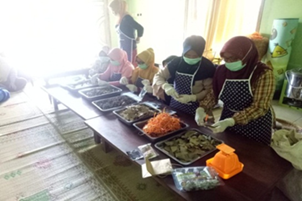Pemberdayaan Perempuan melalui Pengembangan Usaha Minuman Tradisional Wedang Uwuh di Desa Muntuk, Dlingo, Bantul, Yogyakarta Women's Empowerment through the Development of the Wedang Uwuh Traditional Beverage Business in Muntuk Village, Dlingo, Bantul, Yogyakarta
Main Article Content
Abstract
The focus of community service is the empowerment of women through the business development of wedang uwuh traditional beverage. Wedang uwuh is a traditional beverage that is famous among the people of the Special Region of Yogyakarta. Wedang uwuh is a hot or warm beverage that has a sweet and spicy taste with bright red and fragrant aroma. This community service is motivated by the problems: the wedang uwuh business does not yet have a permit for household industrial products (PIRT), the manager does not understand how to market and make branding of wedang uwuh, wedang uwuh does not have packaging that fits the market target tourism, and others. To overcome this problem, in this service a variety of wedang uwuh business development activities were carried out: (1) efforts to manage PIRT permits, product marketing, and branding communication training, marketing training via social media, wedang uwuh packing training, and facilitation of business development tools and appropriate packaging tourist target
Downloads
Article Details
Authors who publish with this journal agree to the following terms:
- Any article on the copyright is retained by the author(s).
- Author grant the journal, right of first publication with the work simultaneously licensed under a Creative Commons Attribution License that allows others to share work with acknowledgment of the work authors and initial publications in this journal.
- Authors are able to enter into a separate, additional contractual arrangements for non-exclusive distribution of published articles of work (eg, post-institutional repository) or publish it in a book, with acknowledgment of its initial publication in this journal.
- Authors are permitted and encouraged to post their work online (e.g., in institutional repositories or on their websites) prior to and during the submission process, as can lead to productive exchanges, as well as earlier and greater citation of published work.
- The article and any associated published material is distributed under the Creative Commons Attribution-ShareAlike 4.0 International License
References
Kusumasari, B., Suyatna, H. 2015. Peningkatan Kapabilitas Pemasaran Pascabencana Bagi Perempuan Hunian Tetap Pager Jurang, Sleman, Yogyakarta. Jurnal Pengabdian Kepada Masyarakat (Indonesian Journal of Community Engagement). 1(1):14-23. https://doi.org/10.22146/jpkm.16925
Lestari, S.P. 2015. Hubungan Komunikasi Pemasaran dan Promosi Dengan Keputusan Memilih Jasa Layanan Kesehatan (Studi Pada Rumah Sakit Islam Lumajang). Interaksi: Jurnal Ilmu Komunikasi. 4(2):139-147. https://doi.org/10.14710/interaksi.4.2.139-147
Mardhiah, N. 2017. Identifikasi Tujuan dan Sasaran Pembangunan Desa Kabupaten Aceh Barat. Jurnal Public Policy. 3(1):77-88. https://doi.org/10.35308/jpp.v3i1.753
Munawaroh, S. 2014. Wedang Uwuh sebagai Ikon Kuliner Khas Imogiri Bantul. Jantra. 9(1):69-79.
Nakir, S. 2013. Otonomi Daerah dan Desentralisasi Desa: Menuju Pemberdayaan Masyarakat Desa. Jurnal Politik Profetik. 1(1):1-21. https://doi.org/10.24252/jpp.v1i1.1621
Oroh, G.S. 2014. Peranan Pemerintah Desa dalam Pemberdayaan Masyarakat di Bidang Pertanian di Desa Tumaratas Kecamatan Langowan Barat Kabupaten Minahasa. Jurnal Politico. 3(2):1-11.
Peraturan Pemerintah Republik Indonesia Nomor 47 Tahun 2015 tentang Perubahan Atas Peraturan Pemerintah Nomor 43 Tahun 2014 tentang Peraturan Pelaksanaaan Undang-undang Desa Nomor 6 Tahun 2014 tentang Desa
Surono, A. 2017. Peranan Hukum Dalam Pengelolaan Sumber Daya Alam Skala Desa Oleh Badan Usaha Milik Desa (Bumdes) Dalam Meningkatkan Kesejahteraan Masyarakat Desa. Jurnal Rechts Vinding: Media Pembinaan Hukum Nasional. 6(3):459-478.
Tyas, A.S.P. 2017. Identifikasi Kuliner Lokal Indonesia dalam Pembelajaran Bahasa Inggris. Jurnal Pariwisata Terapan. 1(1):1-14. https://doi.org/10.22146/jpt.24970
Undang-Undang Republik Indonesia Nomor 6 Tahun 2014 tentang Desa
Wibowo, H.A., WInarni, F. 2017. Dampak Program P2WKSS terhadap Kesejahteraan Keluarga Miskin di Kelurahan Keparakan, Kecamatan Mergangsan, Kota Yogyakarta. Adinegara. 6(3):263-274.
Widjajanti, K. Model Pemberdayaan Masyarakat. Jurnal Ekonomi Pembangunan: Kajian Masalah Ekonomi dan Pembangunan. 12(1):15-27. https://doi.org/10.23917/jep.v12i1.202
Zanibar, Z. 2007. Desa: Pergulatan Mencari Jati Diri. Jurnal Konstitusi. 4(1):171-196.
Zuliyah, S. 2010. Strategi Pemberdayaan Masyarakat Desa dalam Menunjang Pembangunan Daerah. Journal of Rural and Development. 1(2):151-160.
